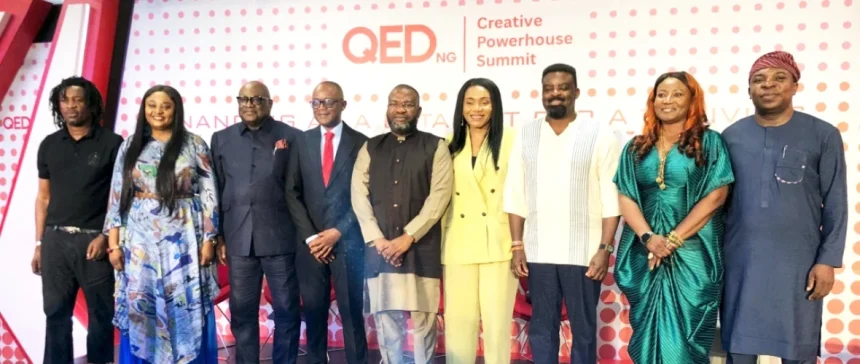Industry leaders have urged creative entrepreneurs, including those in film and music, to evolve from mere craftsmen into skilled businessmen to make the industry a global economic powerhouse.
The experts made the call at the QEDNG Creative Powerhouse Summit on Tuesday in Lagos.
The News Agency of Nigeria (NAN) reports that QEDNG organised the summit.
The event had the theme, ‘Financing as Catalyst for a Thriving Creative Economy’.
Convener, Mr Olumide Iyanda, said the summit aimed to unite key players across Nigeria’s creative, financial and policy sectors to develop actionable strategies for the creative economy.
Iyanda, who is also Publisher of QEDNG, said: “Nigeria’s creative economy contributes about $5.6 billion to GDP and is the country’s second largest employer.
“The Federal Government has set a bold goal of raising the sector’s contribution to $100 billion by 2030.
“Stories are everywhere. Ideas are not the problem. The challenge is turning those ideas into something real.”
Group Managing Director of SO and U, Mr Udeme Ufot, said sustainable sector growth would happen when creators combine talent with business skills, financial literacy and structured access to funding.
He said the creative economy faced numerous roadblocks despite its vast opportunities.
He noted that the sector could not grow without unrestricted access to capital.
“Without access to sustainable and strategic funding, creativity struggles to scale.
“Capital is required to unlock the potential of a creative economy.
“That capital must be available and accessible to creative entrepreneurs to run and scale enterprises to enjoy economies of scale,” he said.
Ufot added that financing must be designed not only to support consumption but also to enable production, distribution and protection of creative output.
“This is not just about throwing money at industry; it’s about smart financing and investors who understand the long tail of content development,” he said.
He said proper, stronger and evidence-based data was needed to inform decisions and show the social and economic impact of the creative economy.
Founder of The Africa Soft Power Group, Dr Nkiru Balonwu, said Nigeria must build an interconnected ecosystem linking creatives to capital, policy, infrastructure and education.
“A system with enabling conditions should allow creatives not just to survive, which most are doing, but to thrive and scale.
“The creative economy is both expression and enterprise.
“It already contributes significantly to Nigeria’s GDP and soft power, yet it lacks scalable, predictable investment frameworks,” she said.
She urged creative stakeholders to collaborate and focus on building ecosystems rather than silos.
“It means actively linking creatives to capital, policy to platforms and education to opportunity.
“It means policymakers taking time to understand new digital distribution models,” she said.
Balonwu also called for stronger data collection to document the value of sectors such as hair, beauty, fashion and weddings, which generate billions but remain undervalued.
She urged entrepreneurs to integrate artificial intelligence into creative processes to expand monetisation and global reach.



